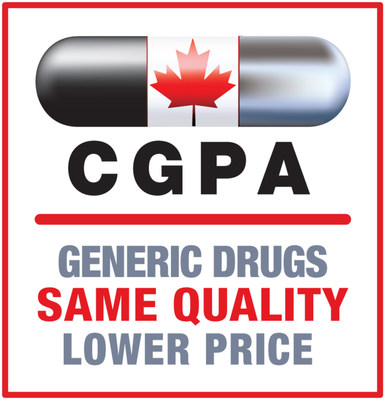CGPA Statement on Pharmaceutical Concessions in United States-Mexico-Canada Agreement
TORONTO, Oct. 1, 2018 /CNW/ - The following is a statement by Jim Keon, President of the Canadian Generic Pharmaceutical Association (CGPA), on the pharmaceutical intellectual property aspects of the United States-Mexico-Canada Agreement (USMCA):

Canada was not at the table when harmful intellectual property provisions were negotiated between the United States and Mexico. The pharmaceutical provisions in USMCA will delay access to competition from biosimilar biologic drugs. Biologic medicines represent the fastest growing cost segment of health-care spending, and these delays will be costly to patients, businesses that sponsor employee drug plans, private payers and our industry.
The United States-Mexico-Canada Agreement is disappointing for the vast majority of Canadians who feel access to more affordable prescription medicines is the most important aspect of the negotiations. A recent poll1 found that four in five Canadians feel that it is important that the negotiations should not delay Canadians access to more affordable versions of expensive biologic drugs. Four in five Canadians also say it's important that the agreement not create new barriers for the implementation of National Pharmacare in Canada.
While the Government of Canada says it is committed to improving access to necessary prescription medication and reducing the amounts Canadian governments pay for these drugs2 this is unfortunately not what they have achieved by agreeing to concessions that reduce access to essential medicines and increase costs for those who pay for drugs.
The USMCA pharmaceutical intellectual property concessions are the latest hit for access to affordable prescription medicines for Canadians. Canada's intellectual property regime for pharmaceuticals was amended in September 2017 as a result of the Comprehensive Economic and Trade Agreement (CETA) with the European Union. The Parliamentary Budget Officer has conservatively estimated that the two-year patent term extension included in CETA will cost Canadians more $500 million annually.3
The pharmaceutical intellectual provisions included in the final text are extensive, and other aspects of the text are concerning. The CGPA is conducting a comprehensive review of the text to ensure there are no additional negative consequences for the Canadian health-care system.
About the Canadian Generic Pharmaceutical Association
The Canadian Generic Pharmaceutical Association (CGPA) represents Canada's generic pharmaceutical industry. The industry plays an important role in controlling health-care costs in Canada. Generic drugs are dispensed to fill more than 71 percent of all prescriptions but account for account for only 21 percent of the $28-billion Canadians spend annually on prescription medicines.
___________________________
1 http://canadiangenerics.ca/news-release62/new-poll-canadians-strongly-agree-that-access-to-affordable-prescription-medicines-is-most-important-priority-for-nafta-2-0/
2 https://pm.gc.ca/eng/minister-health-mandate-letter
3 http://www.pbo-dpb.gc.ca/web/default/files/Documents/Reports/2018/Patent%20Restoration/Patent_Restoration_EN.pdf
SOURCE Canadian Generic Pharmaceutical Association
